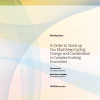The patterns of innovation diffusion are well approximated by the logistic curves. This is the robust empirical fact confirmed by many studies in innovations dynamics. Here we show that the logistic pattern of innovation diffusion can be replicated by the time-dependent stochastic process with positive feedbacks along the diffusion trajectory. The dynamic increasing returns process […]








